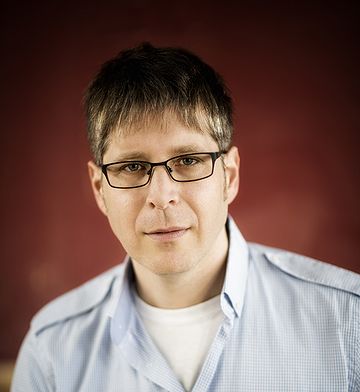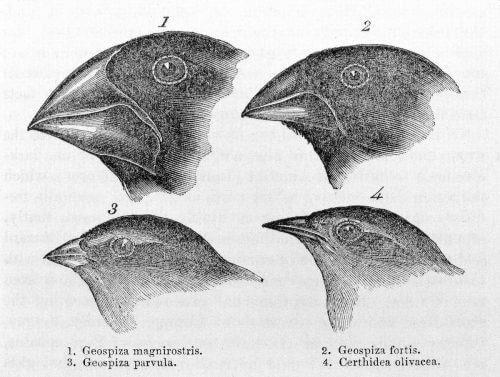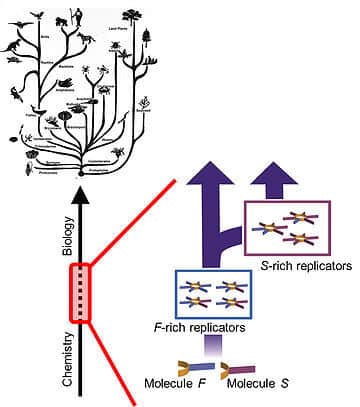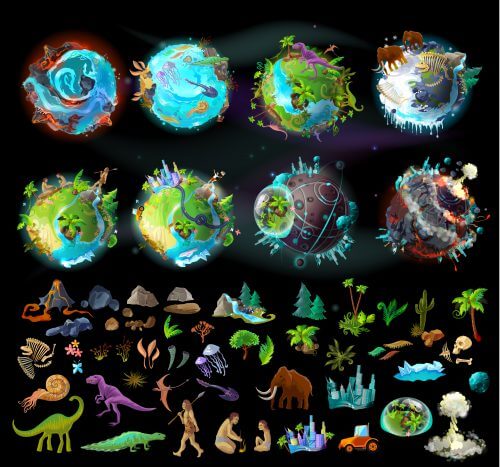Even before there was life on Earth, molecules behaved in a way that mimics life: they replicated and evolved evolutionarily. Dr. Omer Markovich, a graduate of the Weizmann Institute of Science, tries to understand and predict these behaviors with the help of computer models

"How did life begin on Earth? This is too big a question to investigate at once," says Dr. Omer Markovitch, a graduate of the Weizmann Institute of Science and currently a post-doctoral researcher at the University of Groningen in the Netherlands and a fellow of the Netherlands Institute for the Study of Mekorot. "The transition from no life to life is not black and white, but a multi-stage process." Dr. Markovich's research focuses on the chemical origin of life, chemical evolution and complexities in synthetic and biological systems. Below is an interview conducted with him and published on the Dutch science news website NEMO Kennislink.
The beginning of life can be explored in different ways. What is the starting point of your research?
First, I'll explain where I don't start - and why. One common approach is to start with life as we know it today - for example, a simple bacterium - and try and strip it down as much as possible until you get to the bare minimum. With this approach, you get a very "minimal" bacterium, but it is still too complicated to form spontaneously.
You can also start with molecules that we know existed on the early Earth, even before there was life. Such molecules are important building blocks of life. Then you can go on and try to understand how a primitive cell could have formed from these building blocks, perhaps. But the risk in this approach is narrow-mindedness, since we assume that molecules that are essential to life today, formed the basis of primitive life; There is no evidence that this is indeed the case. It is quite possible that these molecules became important to life at a later stage, and that the starting point was quite different. If we fixate on a certain set of molecules, we rule out other possible explanations.
If so, which approach do you advocate?
I'm not trying to decipher the whole process from no life to life. Instead, I focus on two aspects of the process: replication and evolution. There is widespread agreement that these two are critical characteristics of life. I would like to understand how such processes take place at the molecular level. How did such abilities develop? We know that even before life existed, a multitude of molecules were created. I do not focus on this or that specific molecule; My point of view is more abstract. What must happen so that different molecules can together produce systems capable of replicating and adapting? For me, this is chemical evolution: what is evolution for molecules?
Is this similar to evolution as we know it in biological systems?
Yes, I think so. I am trying to apply known principles from evolutionary biology to chemical systems. Chemistry and biology are not separate worlds; We all share the same reality, so I think the same rules apply. The problem is that we do not recognize how such laws work on molecules/chemical systems.

Is it even possible to talk about molecules in general terms? The behavior of molecules is according to their specific characteristics. Even slight changes between molecules can lead to different chemical phenomena.
The principles I am looking for relate to the relationships between molecules that together form a network. The interrelationships between them, and especially the scope of these relationships, affect the behavior of the entire system. If we compare this to the living cell, in which a vast number of reactions occur at the same time, but some of them occur rapidly at a certain moment, and thus slow down or stimulate other reactions; That is, it is a synchronous system that functions accordingly. In other words, I look for emergent behavior (behavior that cannot be predicted from the individual components) of the network, and I try to find out which properties of the system are related to this or that behavior.

What does your research look like in practice?
I mainly build and refine computer models that simulate chemical systems. I am fortunate to collaborate with the research group of Prof. Sybern Otto here in Groningen, so I can use the information and real results from their experiments in my work. In their research, they created a chemical system that replicates by forming rings. These rings can assemble into something that looks like small bits, which in turn exhibit interesting behaviors. My models start from this system. I then merge this with insights from biological evolution to discover the circumstances necessary to cause chemical evolution.
Can you give an example of an evolutionary-biological principle that you use?
Speciation is a good example. Biological evolution teaches us that availability and variety of food are important driving forces behind species specialization and differentiation. When there is a single source of food, the species that consume it most quickly and efficiently will become central, as there is no room left for other species. However, if there are different types of food, different types of species will evolve because there is no longer a need for specialization, and competition for food will decrease. Think for example of "Pharisee Darwin" with the different types of source.
How does this translate to the molecular level?
Mix different types of building blocks that are able to form rings and fibers - even when they are mixed with each other - but they have a different reaction rate. The clone that responds the fastest will become dominant, but what will happen when its preferred building block runs out? Will he adapt or will another replicator take his place - a replicator that grows at a slower rate, but is less picky and can work with a variety of building blocks? By constantly adjusting the conditions and properties, I hope to discover what are the decisive factors that will allow different chemical species to form.
What do you base your choices on? How do you ensure your models are still relevant to chemistry?
It's not completely random; My choices are based on information from chemical experiments conducted in Prof. Otto's laboratory. This is my starting point. Next I choose duplicates that are slightly different from the existing ones, but not too different to react with each other. I try to make informed decisions, but at the end of the day these are decisions, so you never really know. We regularly exchange information and there is a mutual influence between the experiments in the laboratory and my models, and this serves me to improve the predictions, and God forbid.
What do you ultimately hope to learn from your models?
My ultimate goal is to discover the universal laws of evolution.
It's very ambitious
Yes, but it won't happen overnight. My project is planned to last for another two years, and I hope to learn a lot more along the way. For example, how can you design a system with ten potential replicators that will eventually lead to the creation of five species, and how to perfect them? If I can predict how an experiment should be performed and its results, that would be a huge step.

More of the topic in Hayadan:

3 תגובות
Thanks.
exciting
And it's also fun to read how Dr. Markovich touches on the most difficult questions, simplifies and makes them accessible to laymen like me, and all this modestly and in context
Inspire and good luck
Adir! Good luck